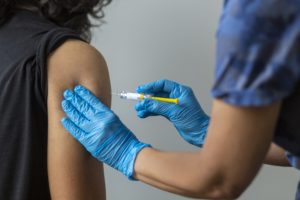This past week my mother-in-law got her first COVID-19 Vaccine. She is a nursing home resident. After months of no visits, then a short time of distant short no contact visits, then no visits again, the whole family is hoping that we will shortly be able to hug again. Are there side effects that make taking such a shot risky?
AARP’s recent article entitled “What Are the Side Effects of COVID-19 Vaccines?” reports that the FDA says the most common side effects among participants in both the Pfizer-BioNTech and Moderna Phase 3 clinical trials were the following:
- Injection site pain
- Fatigue
- Headache
- Muscle pain
- Chills
- Joint pain; and
- Fever.
These reactions are temporary and will “self-resolve” within a few days.
Side effects from vaccines aren’t uncommon. For example, the seasonal flu shot can cause fever and fatigue, or reactions.
Doctors say that a mild to moderate reaction is a good thing because it shows that the immune system is responding to the vaccine. However, the tradeoff, experts say, is temporary discomfort versus the long-term benefits of a potentially high level of protection from COVID-19, a disease that’s responsible for the deaths of more than Four million people globally.
Unfortunately, scams have been part and parcel to fighting the pandemic.
Federal analyses of both vaccine trials show that few adverse events, which the CDC defines as any health problem that happens after a shot (separate from the less serious side effects), were reported. There have been a few people who’ve reported severe allergic reactions — known as anaphylaxis —after receiving the Pfizer-BioNTech vaccine. As a result, the CDC is recommending that anyone who has ever had a severe allergic reaction to any ingredient in a COVID-19 vaccine not get it. The ingredients of authorized vaccines are on the FDA’s website. Talk to your doctor, if you have questions, and keep in mind that serious reactions are relatively rare.
People must continue their prevention efforts to help slow the spread of the disease: mask-wearing, social distancing, and frequent handwashing. Note that it typically takes a few weeks for the body to build immunity to disease after vaccination, so it’s possible you can get sick with COVID-19 even after you’ve been vaccinated. Experts also aren’t certain if the vaccines also block transmission of the virus.
Remember that it takes time to build up herd immunity, where enough of the population is protected from the virus that transmission slows significantly. Scientists aren’t sure what the magic number is to obtain herd immunity for COVID-19, but they think it’s around 70% of the population, which could take months to achieve through vaccination.
Three other relatives of mine have also received the first vaccine shots, as they are all health care workers. None have had side-effects. As the vaccines become more available, we will have some return to normalcy.
We are hopefully rounding third and heading for home on the battle with COVID-19 and the vaccine is the key.
As repeated in the Musical Hamilton, I know “I’m Not Going to Miss My Shot”.
Neither should you.
Reference: AARP (Dec. 21, 2020) “What Are the Side Effects of COVID-19 Vaccines?”
Find Us Online
Building wealth is only half the job. Protecting wealth for your loved ones and yourself is equally important. Through estate planning, business planning, and asset protection, our firm will help you protect everything you love — family, friends, and favorite charities. For more information be sure to visit our website where you will have access to our blog, events schedule, and a complimentary newsletter subscription!


